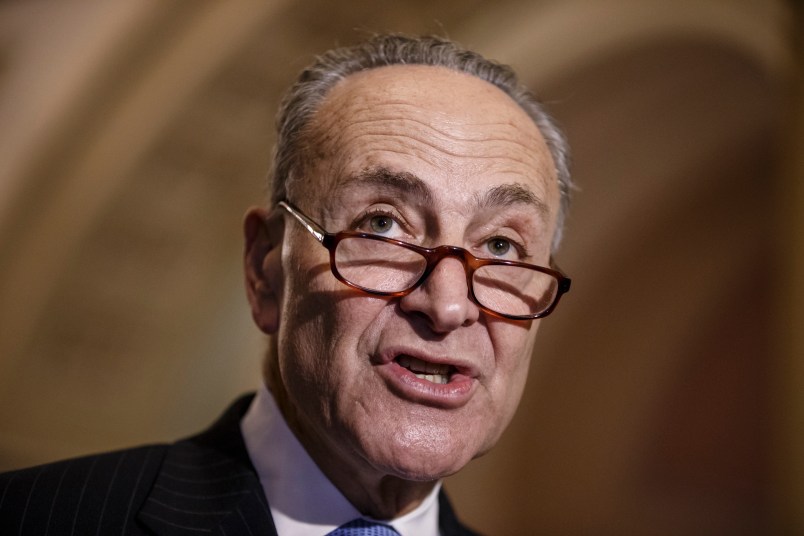Sen. Chuck Schumer (D-NY) moved to rebuke comparisons of the controversial religious freedom law Indiana Gov. Mike Pence (R) signed into law to the federal Religious Freedom Restoration Act the late Sen. Ted Kennedy (D-MA) crafted and then-Rep. Schumer introduced in 1993.
Schumer’s argument, published on Facebook, is in response to cries of hypocrisy among defenders of Pence’s move to sign the law. The argument, made by Pence himself, is that Democrats are bashing the law but key members, including President Barack Obama supported similar legislation in the past.
According to Schumer, the federal RFRA is much narrower.
“First, the federal RFRA was written narrowly to protect individuals’ religious freedom from government interference unless the government or state had a compelling interest,” Schumer wrote. “If ever there was a compelling state interest, it is to prevent discrimination. The federal law was not contemplated to, has never been, and could never be used to justify discrimination against gays and lesbians, in the name of religious freedom or anything else.”
Pence’s law, Schumer also said, aims to protect companies and businesses, unlike the federal law.
Second, the federal RFRA was written to protect individuals’ interests from government interference, but the Indiana RFRA protects private companies and corporations. When a person or company enters the marketplace, they are doing so voluntarily, and the federal RFRA was never intended to apply to them as it would to private individuals.
Schumer’s full Facebook post is below:
In the uproar over the recently passed Indiana Religious Freedom Restoration Act (RFRA), defenders of the bill like Indiana Gov. Pence are trying to hide behind the argument that the law “simply mirrors” the federal RFRA Sen. Ted Kennedy wrote and I introduced as a Congressman in 1993. That may be true only if you’re using a Funhouse mirror. In reality, it is completely false, and a disingenuous argument to boot; they should cease and desist immediately comparing the federal RFRA of 1993 to their present, misguided law.
There are two simple reasons the comparison does not hold water.
First, the federal RFRA was written narrowly to protect individuals’ religious freedom from government interference unless the government or state had a compelling interest. If ever there was a compelling state interest, it is to prevent discrimination. The federal law was not contemplated to, has never been, and could never be used to justify discrimination against gays and lesbians, in the name of religious freedom or anything else.
Second, the federal RFRA was written to protect individuals’ interests from government interference, but the Indiana RFRA protects private companies and corporations. When a person or company enters the marketplace, they are doing so voluntarily, and the federal RFRA was never intended to apply to them as it would to private individuals.
Because of these significant, legal differences, the Indiana RFRA in no way resembles the intent or application of the federal RFRA. As the signer of the bill, Governor Pence should put a stop to it immediately.






